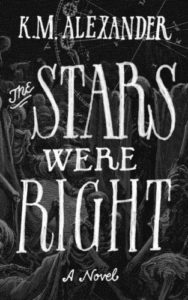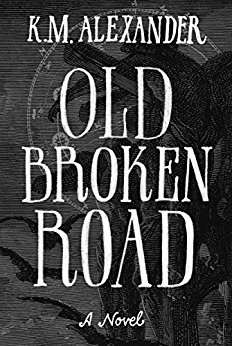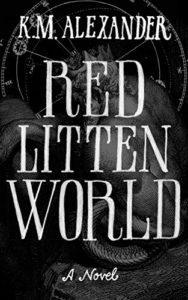KM Alexander goes all Lovecraftian
K.M Alexander writes steampunk-ish fantasy steeped in Lovecraft mythos, and was kind enough to answer a few questions…
Oh man, where to begin. The Bell Forging Cycle is a lot of things, but I tend to categorize it as Lovecraftian Urban Fantasy. It takes place in a world where Lovecraft’s old ones returned destroyed the earth and then disappeared into myth once more. Now, a new society has risen from the ashes of the former. It follows the adventures of a blue-collar caravan master named Waldo Bell who travels between cities and battles eldritch terrors. It’s set mainly in Lovat, a giant multi-leveled megalopolis that sits along the coast, built on the ruins of a drowned city. The effect of the elder gods return has significantly changed the world. Humanity is no longer alone, and they now interact with a wide variety of other species within the warrens of Lovat. The series is currently a trilogy, but I intend on it being a sextet when all is said and done. It’s been a blast to write.
2. What writers influenced your work, or that you enjoy?
Lovecraft is the obvious answer since my books are based on his mythos. I’d be remiss not to mention him. China Miéville is my favorite modern author. I devour everything from him, his command of language is lovely. His Bas-Lag novels—The Scar in particular—heavily influenced me and my books. He opened my eyes and showed me that fantasy didn’t have to conform to elves and dwarves and dragons. I’ve loved weird fiction ever since I read his work. Stephen King has been another huge influence on me, in particular, his Dark Tower Series. His ability to capture people, flaws and all, is stunning. Neil Gaiman would be the other significant influence, especially American Gods. I have so many more favorites though: Ursula K. Le Guin, Mark Twain, Octavia Butler, Cormac McCarthy, the list goes on and on.
3. Did you read much science fiction and/or fantasy as a kid?
I didn’t read much fantasy growing up, most of my reading as a kid was science fiction, spy thrillers, and westerns. A lot of my early reading was based on what I could glean from my grandfather’s library. I read Tolkien and C.S. Lewis, but outside of their work fantasy wasn’t high on my reading list. Most of the science fiction I read was forgettable, Battletech novels and Star Wars EU (RIP) stuff. I read more and more as I got older and began branching into other genres. I was introduced to Lovecraft’s work in college by a friend and came to horror and fantasy through Lovecraft. It’s been interesting.
I didn’t read much fantasy growing up, most of my reading as a kid was science fiction, spy thrillers, and westerns. A lot of my early reading was based on what I could glean from my grandfather’s library. I read Tolkien and C.S. Lewis, but outside of their work fantasy wasn’t high on my reading list. Most of the science fiction I read was forgettable, Battletech novels and Star Wars EU (RIP) stuff. I read more and more as I got older and began branching into other genres. I was introduced to Lovecraft’s work in college by a friend and came to horror and fantasy through Lovecraft. It’s been interesting.
4. Tell us about your working style, how do you approach your writing. Do you research extensively? Do you write every day?
George R. R. Martin talks about two types of writers, he calls them the architect and the gardener. The architect works from a blueprint, or an outline, whereas the gardener is looser and explores the growth of their story naturally. (Sometimes people call these the plotter and the pantser.) It turns out that I’m neither of these! I find that I’m somewhat of a hybrid. I started as an architect, but I’ve found the more I’ve written then looser I want to plot my books. I like the thrill of discovery. When I start a new project I tend to have a loose idea of the critical structure, and I’ve mapped out the significant plot points, and then I let myself discover things along the way.
I research a lot—often as I go. I’m usually mulling over something. (Right now it’s complex particle theory. Yay!) I think research is vital for creating believable worlds, especially when you’re writing second world fantasy or far-future Lovecraftian horror. That means I tend to take a lot of notes.
I try to write every day, but sometimes it’s difficult. What I find is I tend to write in spurts. I’ll sit down on the weekend and put down ten-thousand words, and then I’ll be done for a few days. That said, for me, the habit, of trying to write has been necessary. Without that habit you don’t finish, and if you don’t finish, you don’t have books.
George R. R. Martin talks about two types of writers, he calls them the architect and the gardener. The architect works from a blueprint, or an outline, whereas the gardener is looser and explores the growth of their story naturally. (Sometimes people call these the plotter and the pantser.) It turns out that I’m neither of these! I find that I’m somewhat of a hybrid. I started as an architect, but I’ve found the more I’ve written then looser I want to plot my books. I like the thrill of discovery. When I start a new project I tend to have a loose idea of the critical structure, and I’ve mapped out the significant plot points, and then I let myself discover things along the way.
I research a lot—often as I go. I’m usually mulling over something. (Right now it’s complex particle theory. Yay!) I think research is vital for creating believable worlds, especially when you’re writing second world fantasy or far-future Lovecraftian horror. That means I tend to take a lot of notes.
I try to write every day, but sometimes it’s difficult. What I find is I tend to write in spurts. I’ll sit down on the weekend and put down ten-thousand words, and then I’ll be done for a few days. That said, for me, the habit, of trying to write has been necessary. Without that habit you don’t finish, and if you don’t finish, you don’t have books.
5. Are you a full time writer or do you hold down another job?
Both? I put at least forty hours a week into my writing. But, during the day I work as a user-experience designer. Both gigs are creative but in different ways. I enjoy each of them. The design skills have helped a lot with writing. It lets me do a lot of cool stuff to go along with my books.
6. Can you tell us anything about what you’re working on next?
Absolutely! I’m currently editing a novel called Coal Belly. It’s a weird-west steampunky story that takes place on a world covered in rivers and swarming with steamboats. It tells the story of occupation, gunfights, conquest, terrorism, and magic. And it explores the ramifications of all of that from a variety of perspective characters. It’s been a blast to write and is my longest work to-date. About twice the size of my other books. I’m really proud of it, and I can’t wait to share it with readers.
Absolutely! I’m currently editing a novel called Coal Belly. It’s a weird-west steampunky story that takes place on a world covered in rivers and swarming with steamboats. It tells the story of occupation, gunfights, conquest, terrorism, and magic. And it explores the ramifications of all of that from a variety of perspective characters. It’s been a blast to write and is my longest work to-date. About twice the size of my other books. I’m really proud of it, and I can’t wait to share it with readers.





